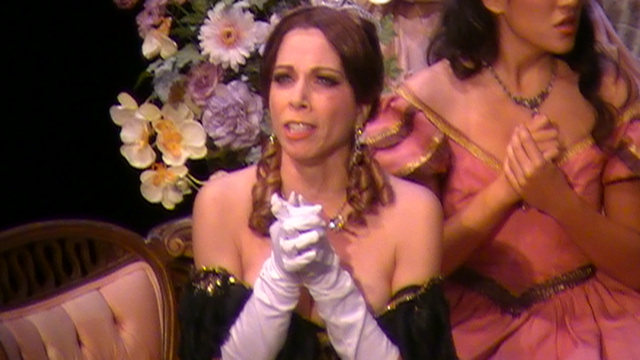Soprano shines in Miami Lyric Opera’s “Traviata”

Susana Diaz delivered an affecting performance as Violetta in Miami Lyric Opera's "La Traviata."
Judging from the sold-out house for Verdi’s La Traviata Saturday evening, word has spread about the growing quality of Miami Lyric Opera’s productions.
When the curtain rose for Act 1, the set for the courtesan Violetta Valery’s salon received a round of applause, a rare event for this budget-conscious company. But set and costume designers went all out to bring this scene of wealthy 19th-century Paris to life, creating a sparkling setting of fabric-covered tables, antique chairs, candelabras, flowers, lavishly gowned women, glittering jewelry and red-jacketed footmen
This performance at the Colony Theater in Miami Beach was not the triumph of the company’s recent production of La Bohème, where an ensemble of young singers brought the work’s bohemian pathos to life in a manner rarely achieved at major opera houses. But it was an ardent and generally well-sung performance, representing improved production values and professionalism for the six-year-old opera company.
The Miami soprano Susana Diaz scored a hit as Violetta, absolutely inhabiting the role as an actress and singing with a darkly veiled voice that, while lacking the volume for a some of the big moments, delivered passages of passionate lyricism and negotiated the coloratura with ease. Her stage manner is subtle and affecting, with none of the wrist-on-the-forehead dramatics of rote actresses. As her face darkens as she realizes what Alfredo’s father is asking of her, you can see the conflict in Violetta’s heart as she agonizes over whether to sacrifice her only experience of love.
In Un dì, felice her absolutely secure and unforced coloratura allowed the vocal acrobatics to serve the music and the drama, rather than draw attention to themselves. She is capable of melting, soft high notes, as in Ah, fors’è lui and she brings Violetta’s anguish and conflict into her voice, as she sings of her heartache as Alfredo and the Baron confront each other. But she lacked the vocal power for a few moments, such as her climactic farewell to Alfredo, Amami, Alfredo, where her voice couldn’t carry over the orchestra.
As Alfredo, the tenor David Pereira started off a bit shakily in his Act I Brindisi, but quickly gained his vocal footing. Like Diaz, he does not have a large voice, but it is well-centered, with an appealing tone and a tenorial ping, as he soon displayed in Un dì, felice. As an actor, Pereira is a bit stiff and unable to keep up with Diaz, though he brought a fiery edge to his tone as he confronted Violetta in the second act and uniting vocally with Diaz in Parigi, o cara.
As Alfredo’s father Giorgio Germont, the baritone Nelson Martinez was the imposing image of middle-class respectability, complete with three-piece suit and walking stick. His voice was not made for extended lines of legato, as in his long scene with Violetta, as he tries to convince her to leave Alfredo for the good of his family. But he used it effectively, delivering moments of dramatic power as he tries to comfort her. And his singing was at its best in the upper register, as he displayed in Di Provenza il mar and his rebuke of his son for his humiliation of Violetta.
Verdi doesn’t give the secondary roles in this opera much to do, but the soprano Daisy Su made an appealing Annina. And although she had a tiny part as Violetta’s friend Flora, the soprano Rebekah Diaz displayed a lyric voice that deserves a larger role in future productions.
Founded in 2004 by the retired Italian tenor Raffaele Cardone who remains general director, Miami Lyric Opera is intended to offer an alternative to South Florida’s big opera companies and provide performance opportunities for young singers. The company specializes in straightforward productions of Italian repertoire, planning this season to stage Mascagni’s rarely heard L’Amico Fritz, Verdi’s Rigoletto and Donizetti’s L’elisir d’amore.
The orchestra remains too small and technically challenged to do justice to larger-scale operas mounted by this company, such as Traviata. The string section played with improved intonation over past performances, although it still is far from perfect. Horns hit some wrong notes in Verdi’s oom-pah-pah accompaniments. But conductor Beverly Coulter held the group together and delivered some effective moments, such as the nervous, tension-filled figures in Act II and the ensemble section at the end of the gambling scene.
Posted in Performances
Leave a Comment
Sun Oct 10, 2010
at 12:30 pm
No Comments




